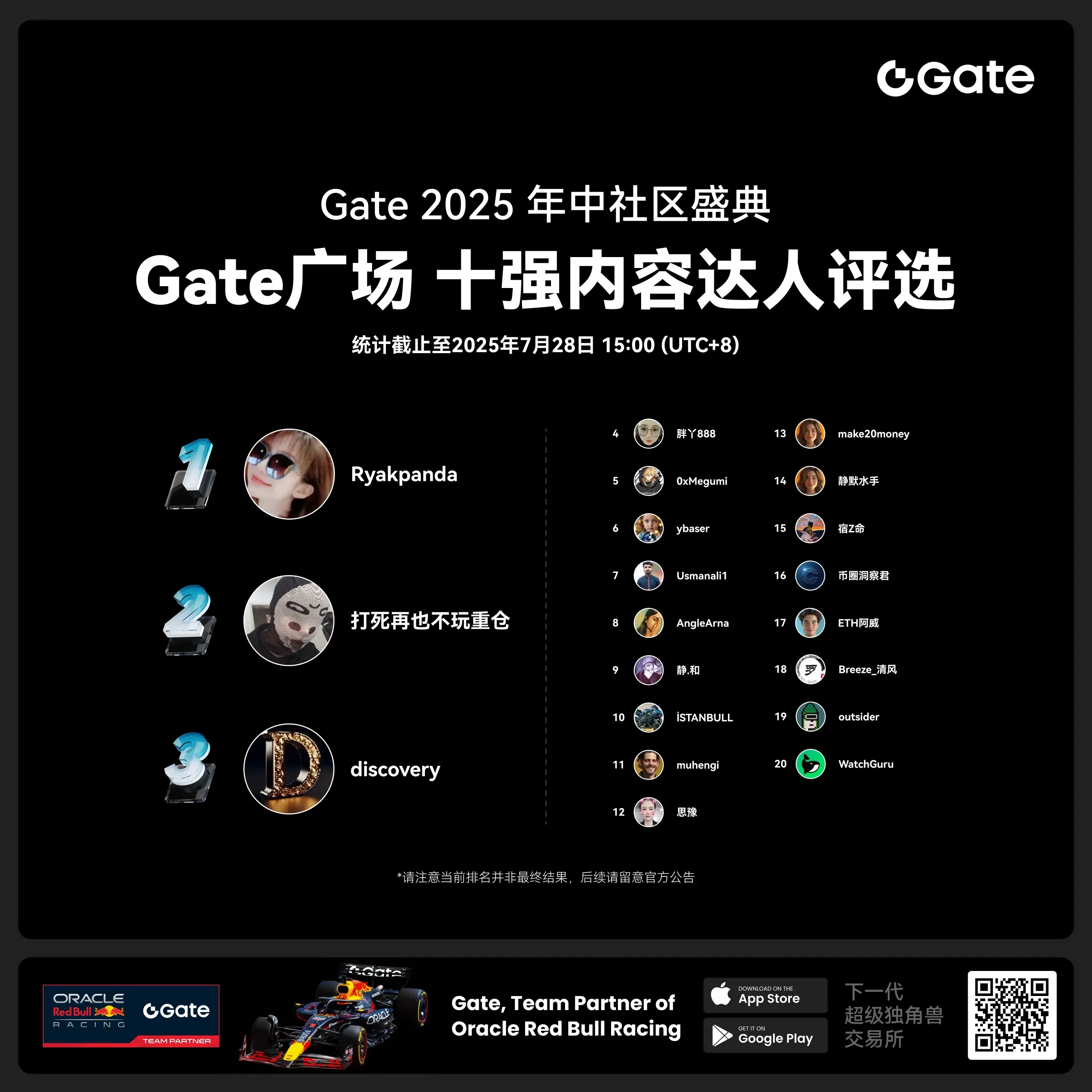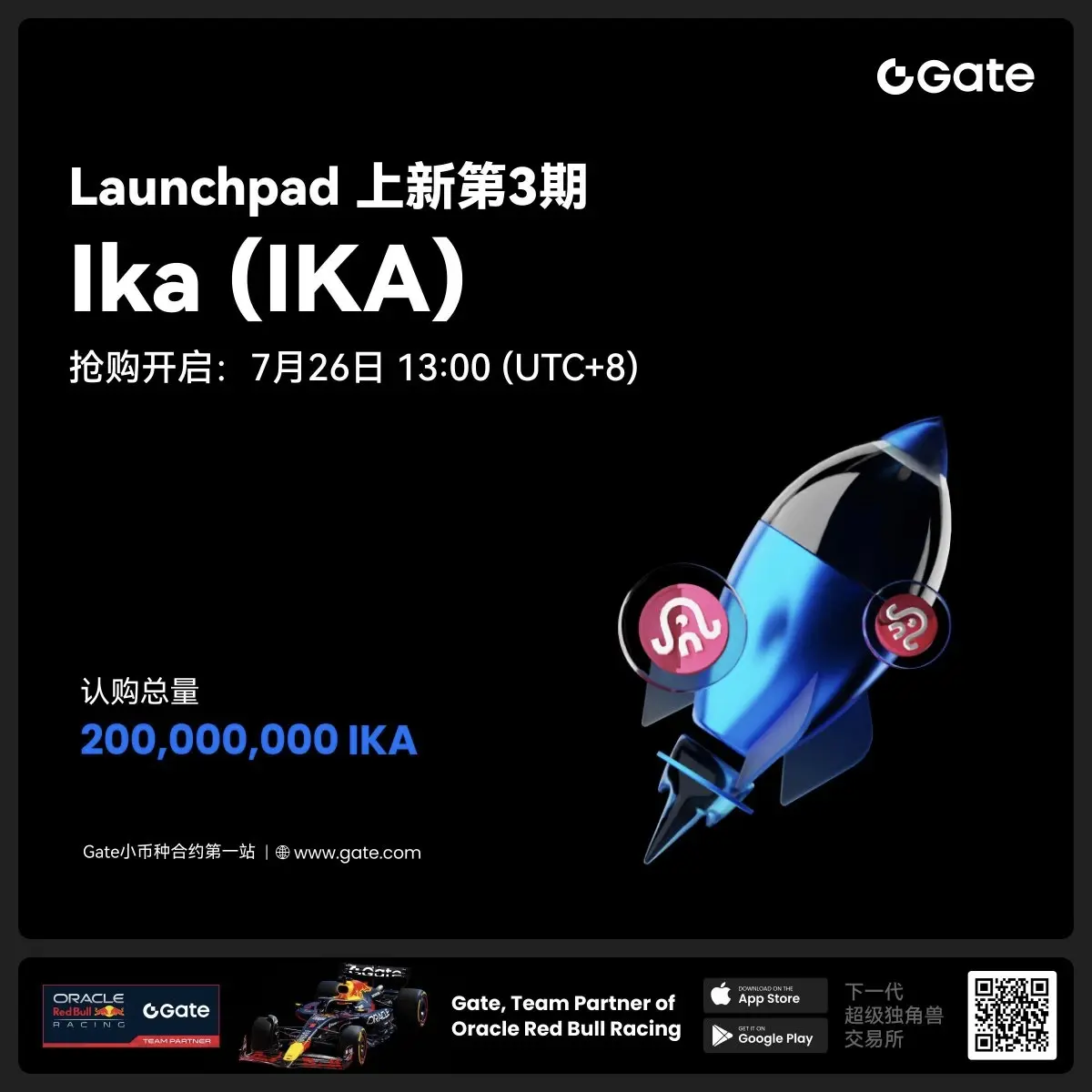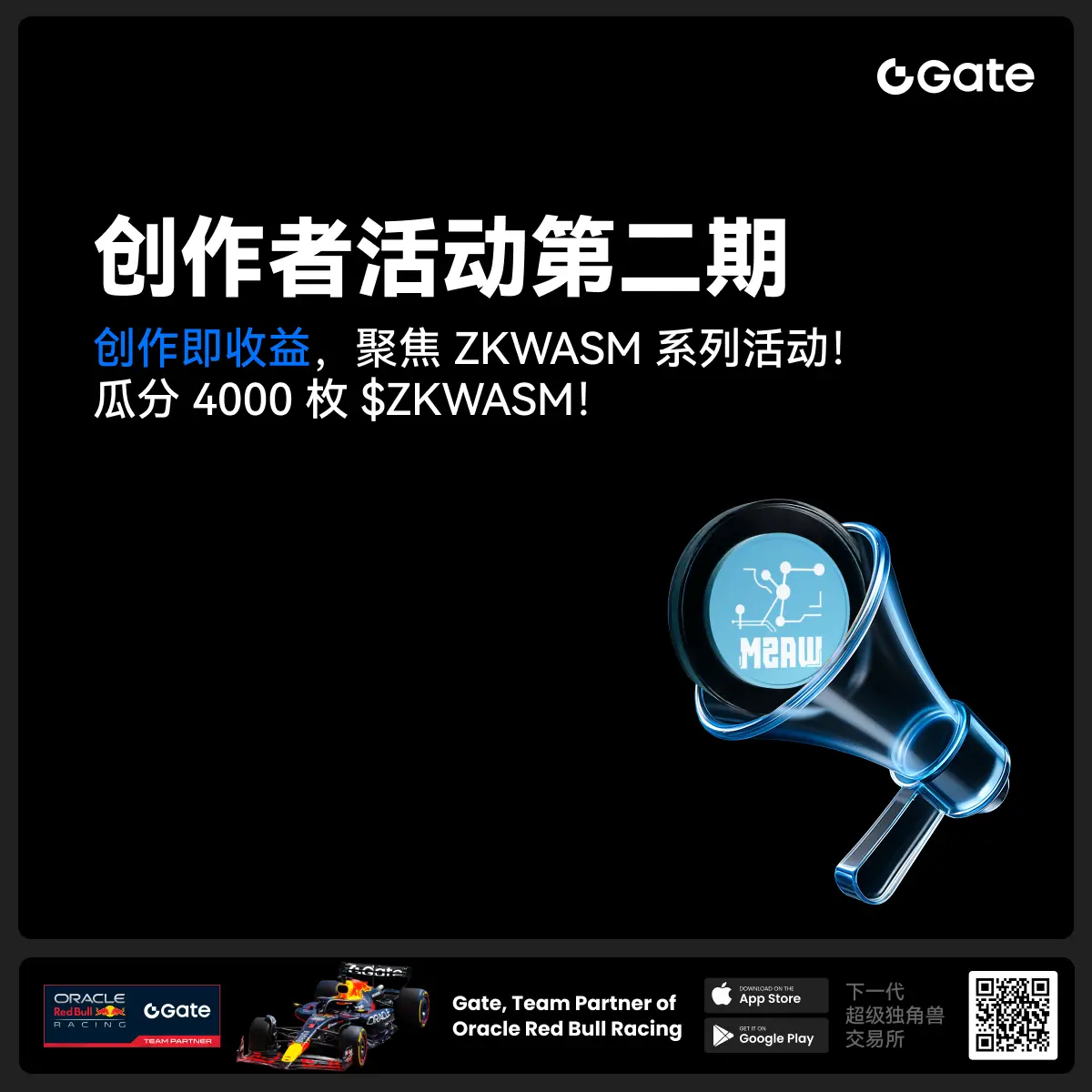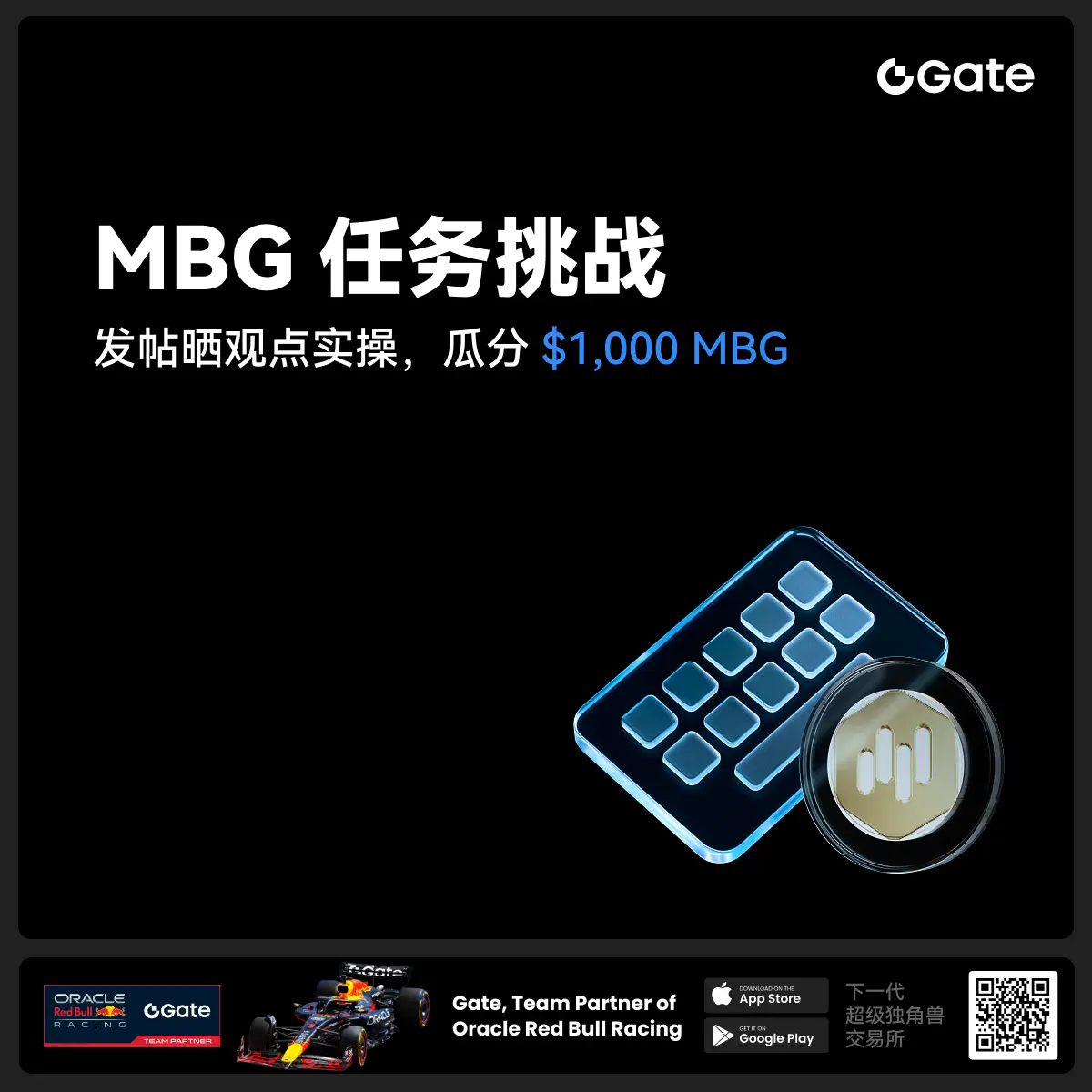- 话题1/3
51k 热度
9k 热度
42k 热度
2k 热度
720 热度
- 置顶
- 亲爱的广场用户们, #Gate 2025年中社区盛典# 投票中!🔥
🙌 广场内容达人TOP40榜单新鲜出炉!速速围观榜单,为你喜爱的达人疯狂打call吧:
www.gate.com/activities/community-vote
每天完成【广场】互动任务可获得助力值,每投出30助力值即可参与抽奖一次!
iPhone 16 Pro Max 512G、金牛雕塑、潮流运动套装、合约体验券、热门币种等你抽!
助力越多,中奖机率越大,下一个抱走iPhone 16的锦鲤就是你!🧧
别犹豫,带上你的“欧气”,为达人冲榜赢大奖!
https://www.gate.com/announcements/article/45974
- 🎉 Gate 广场 IKA Launchpad 发帖活动来袭!🎉
Gate Launchpad 认购 IKA 最后24小时!晒出你的认购体验,和大家一起分享,每个人都有机会瓜分 $200 奖池!
🎁 4位幸运分享者*$50合约体验券每人!
🧐 如何参与:
1.在广场发帖,带上 #GateLaunchpad上线IKA# 标签
2.晒出你的认购截图 或 分享你的独特认购小窍门/心得或趣事
3.保证帖子大于50字,内容有趣有料,原创,集齐至少3个互动(点赞/评论/转发)
IKA认购链接:https://www.gate.com/launchpad/2336?downgarde=true
活动时间:7月28日 12:00 - 7月30日 24:00 (UTC+8)
赶快加入,分享你的精彩时刻,你就是下一个幸运儿!
- 📢 Gate广场 #创作者活动第二期# 正式开启!
聚焦 ZKWASM 系列活动,分享你的观点,瓜分 4,000 枚 $ZKWASM!
ZKWASM 作为 zk 公链先锋,正在 Gate 平台重磅推广!
三大活动联动上线:Launchpool 认购、CandyDrop 空投、Alpha 专属交易——不要错过!
🎨 活动一:发布广场贴文,赢内容奖励
📅 时间:7月25日 22:00 - 7月29日 22:00(UTC+8)
📌 参与方式:
- 在 Gate 广场发布与 ZKWASM 或其三大活动相关的原创内容(不少于 100 字)
- 添加标签: #创作者活动第二期# #ZKWASM#
- 附本人参与 Launchpool/CandyDrop/Alpha 的截图(如认购、空投或交易)
🏆 奖励设置:
- 一等奖(1名):1000 枚 $ZKWASM
- 二等奖(2名):500 枚 $ZKWASM
- 三等奖(10名):100 枚 $ZKWASM
📋 评选标准:内容质量、互动量、项目相关性,附活动参与截图者优先。
📢 活动二:发推赢传播力奖励
📌 参与方式:
- 在 X(推特)发布与 ZKWASM 或三大活动相关的原创内容(不少于 100 字)
- 添加标签: #ZKWASM # GateSquare
- 填写登记表 👉 https://www.gate.com/quest
- 📢 Gate广场 #MBG任务挑战# 发帖赢大奖活动火热开启!
想要瓜分1,000枚MBG?现在就来参与,展示你的洞察与实操,成为MBG推广达人!
💰️ 本期将评选出20位优质发帖用户,每人可轻松获得50枚MBG!
如何参与:
1️⃣ 调研MBG项目
对MBG的基本面、社区治理、发展目标、代币经济模型等方面进行研究,分享你对项目的深度研究。
2️⃣ 参与并分享真实体验
参与MBG相关活动(包括CandyDrop、Launchpool或现货交易),并晒出你的参与截图、收益图或实用教程。可以是收益展示、简明易懂的新手攻略、小窍门,也可以是现货行情点位分析,内容详实优先。
3️⃣ 鼓励带新互动
如果你的帖子吸引到他人参与活动,或者有好友评论“已参与/已交易”,将大幅提升你的获奖概率!
MBG热门活动(帖文需附下列活动链接):
Gate第287期Launchpool:MBG — 质押ETH、MBG即可免费瓜分112,500 MBG,每小时领取奖励!参与攻略见公告:https://www.gate.com/announcements/article/46230
Gate CandyDrop第55期:CandyDrop x MBG — 通过首次交易、交易MBG、邀请好友注册交易即可分187,500 MBG!参与攻略见公告:https://www.gate.com/announcements
- 📢 #Gate广场征文活动第三期# 正式启动!
🎮 本期聚焦:Yooldo Games (ESPORTS)
✍️ 分享独特见解 + 参与互动推广,若同步参与 Gate 第 286 期 Launchpool、CandyDrop 或 Alpha 活动,即可获得任意奖励资格!
💡 内容创作 + 空投参与 = 双重加分,大奖候选人就是你!
💰总奖池:4,464 枚 $ESPORTS
🏆 一等奖(1名):964 枚
🥈 二等奖(5名):每人 400 枚
🥉 三等奖(10名):每人 150 枚
🚀 参与方式:
在 Gate广场发布不少于 300 字的原创文章
添加标签: #Gate广场征文活动第三期#
每篇文章需 ≥3 个互动(点赞 / 评论 / 转发)
发布参与 Launchpool / CandyDrop / Alpha 任一活动的截图,作为获奖资格凭证
同步转发至 X(推特)可增加获奖概率,标签:#GateSquare 👉 https://www.gate.com/questionnaire/6907
🎯 双倍奖励机会:参与第 286 期 Launchpool!
质押 BTC 或 ESPORTS,瓜分 803,571 枚 $ESPORTS,每小时发放
时间:7 月 21 日 20:00 – 7 月 25 日 20:00(UTC+8)
🧠 写作方向建议:
Yooldo
The renaissance returns with decentralized AI
Opinion by: Matt Wright, co-founder and chief executive officer of Gaia
In the mid-1400s, Gutenberg’s press removed the monopoly on written knowledge. Literacy expanded, institutions changed and the public finally gained access to ideas locked behind elite control.
Today, decentralized artificial intelligence (DeAI) triggers a similar shift by expanding access to intelligence and reshaping who gets to build with it.
The decentralization of AI challenges the prevailing structure of AI today. Most platforms operate as closed systems. Model weights are hidden, data pipelines are proprietary and decision-making happens behind APIs. That control has enabled a small number of companies to determine how intelligence evolves and who can use it.
DeAI reduces that dependency and changes how intelligence is created, governed and distributed.
The hidden costs of closed AI platforms
The closed nature of centralized AI systems creates bottlenecks as a result of limited access, which, in turn, leads to a narrow worldview. In documented cases, centralized technology has produced biased decisions, opaque outcomes and even wrongful arrests. These risks stem from centralized control over inputs, design and data.
Even the goals of central AI companies are evolving under pressure. In 2025, OpenAI scrapped plans to become a fully for-profit entity and restructured its commercial arm into a public benefit corporation controlled by its nonprofit parent. While the move signaled that public interest remains a priority, it also revealed how fragile that commitment can be when tied to corporate governance
DeAI removes that dependency entirely. It embeds public benefit into the architecture by engineering it into how the system works.
DeAI is already transforming communities and markets
DeAI developers can run models locally, fine-tune them on regional data, and adapt them to specific constraints. The tools do not depend on bandwidth, commercial licenses or corporate approval. They operate where centralized tools often cannot.
Farmers in India use voice assistants trained in local dialects to plan crop cycles. In Sierra Leone, teachers use AI chatbots via low-data messaging apps to get real-time lesson support that’s more accurate and cost-effective than traditional web search. In rural Guatemala, midwives use an AI-powered smartphone application to monitor fetal health during home visits, enabling real-time assessments without internet access and improving maternal care in low-resource settings.
All of these projects are created by the human beings using them — people who have historically been left out of global tech development.
Building an AI agent is now easier than ever. Tutorials show how anyone can create functional AI agents without coding. For more technical users, platforms offer code-based and visual development tools. The barriers to entry are significantly low
Related: Centralized AI threatens a democratic digital future
Businesses are also following suit. Retailers train small models on transaction data to improve logistics. Enterprises customize open-weight models for internal operations. According to DappRadar, decentralized AI applications are gaining market share quickly enough to potentially challenge DeFi and gaming in Web3.
DeAI is already reshaping how people work, learn and solve problems in their communities. With every implementation, intelligence becomes less abstract, more applicable, more situated and more local.
A new ideological divide in AI
The most common critique of DeAI is that decentralization leads to inconsistency or misinformation. These concerns are not new. When Gutenberg’s press appeared, critics warned of unverified texts and social disorder. The long-term result, however, was scientific progress, literacy and broader participation in public discourse.
Transparent systems support oversight. Open models can be inspected. Community norms can govern local implementations. Ethical controls can evolve in the open rather than being dictated by a single set of corporate values.
This divergence reflects a broader ideological split in the AI community. Dario Amodei, CEO of Anthropic, has championed a safety-focused, centralized approach as outlined in his essay, “Machines of Loving Grace.” He argues that responsible AGI requires tightly controlled development
On the other hand, Ben Goertzel, founder of SingularityNET, has warned that centralized AGI development risks reinforcing the narrow worldviews of its creators. In a recent interview, he called for intelligence to emerge from global collaboration and local adaptation.
These positions influence incentives, risk models and global access. Centralized systems prioritize uniformity and control. Decentralized systems allow intelligence to evolve within diverse cultures, industries and use cases. That flexibility is already shaping new markets and new institutions.
DeAI revives the ethos of the original Renaissance
The next phase of AI will be defined by who gets to participate. The more intelligence moves into public hands, the more durable, adaptable and representative it becomes. Developers are moving away from closed APIs, public institutions are investing in sovereign infrastructure, and community-built models appear in places with limited reach of Big Tech tools. Intelligence is no longer built only for the world — it is built by it.
We are still early in this transition, and what comes next depends on what we build. That means investing in decentralized infrastructure, funding local projects and, above all, creating the tools to shape intelligence as accessible as the tools to read and write.
The first Renaissance expanded who could read. This one will expand who gets to think, compute and build — everywhere.
Opinion by: Matt Wright, co-founder and chief executive officer of Gaia.
This article is for general information purposes and is not intended to be and should not be taken as legal or investment advice. The views, thoughts, and opinions expressed here are the author’s alone and do not necessarily reflect or represent the views and opinions of Cointelegraph.